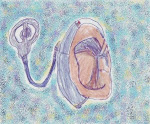 s it sound like to take a bath?” This is just one of many questions I’ve been asked since becoming a parent to deaf children. I had to frantically search my mental thesaurus to describe to my children how the water sounds to me but feels to them. By day, they wear cochlear implants, electronic devices where one part is surgically implanted under the skin near the ear. A second part, the external processor, is removable by the patient during activities such as swimming, bathing and sleeping. Once removed, my children are in a world of silence.
s it sound like to take a bath?” This is just one of many questions I’ve been asked since becoming a parent to deaf children. I had to frantically search my mental thesaurus to describe to my children how the water sounds to me but feels to them. By day, they wear cochlear implants, electronic devices where one part is surgically implanted under the skin near the ear. A second part, the external processor, is removable by the patient during activities such as swimming, bathing and sleeping. Once removed, my children are in a world of silence.
My son Gage, was born with Goldenhar Syndrome, explained by Dr. Nathaniel Robin, Professor of Genetics and Pediatrics at UAB. “This is a rare craniofacial disorder in which affected children have underdevelopment of the face and ears, with one side being more severely affected than the other. Hearing is often affected, and other birth defects are common. These include abnormalities of the eye, spine, heart and kidneys. While the physical appearance may be striking, the vast majority of people with Goldenhar have normal intelligence. This is why early identification and correction of any hearing deficit is so important.”
Among many other abnormalities noted at birth, he failed his newborn hearing screening ... he was profoundly deaf. Little did I know that his little sister Brooklyn, born two and a half years later, would follow his path to silence. Passing her newborn hearing screening and with no apparent syndrome, you can imagine my surprise when I found out she couldn’t hear well at nine months of age. Her brother had just received a cochlear implant, so shouldn’t I have seen the warning signs?
Unlike her profoundly deaf brother, she had some hearing, so if I raised my voice or moved in closer, she could hear me. Having one deaf child already, this was “our normal.” Her progressive hearing loss soon led her to qualify for cochlear implants also. Knowing that Gage had a syndrome, a reason for his deafness, we decided to have genetic testing on the whole family since she may question her hearing loss later in life or when she decided to have children of her own. No genetic links between the two were found as reason for their hearing loss.

As Dr. Robin further explains, “Over half of all hearing loss in children is caused by genetic factors. In most cases, these genetic anomalies cause no other abnormalities, and are therefore termed ‘isolated.’ In other cases there are associated problems, and the hearing loss is called ‘syndromic.’ But the genetic cause is not known for all syndromes. Goldenhar is one such example. While we believe it is low, we cannot with certainty state what the likelihood is that Gage or his siblings will have a hearing-impaired child.”
Ironically, it is possible for deaf children to become good listeners. According to Natalie Baldwin, an Auditory-Verbal Therapist/Speech-Language Pathologist at The Children’s HEAR Center, “It is my job to educate the family how to stimulate speech, language and auditory development in their child. Through weekly sessions, we target vocabulary, language, listening and speech tasks that will help the child develop just like their typically hearing peers.” Natalie warns that even a minimal hearing loss can impact a child’s speech and language development. If you have concerns regarding your child’s hearing, she suggests you ask your pediatrician for a referral to a pediatric audiologist.

It’s common practice at my house to narrate daily activities. In fact, this part of auditory-verbal therapy could benefit almost all children, with or without hearing loss, since its focus is language input. When it’s time to cook dinner, I let them help, exposing them to as much language as possible. Also, I may ask them retell the list of ingredients in a dish to Dad during a meal, giving them a chance to verbalize and improve their memory skills. So try to include the children in your daily activities, they might become better listeners!
http://www.deafkidscanhear.blogspot.com/







 Chloe's surgery was a success and responses had been detected from electrodes in each ear. CHLOE WOULD HEAR!!!
Chloe's surgery was a success and responses had been detected from electrodes in each ear. CHLOE WOULD HEAR!!!








